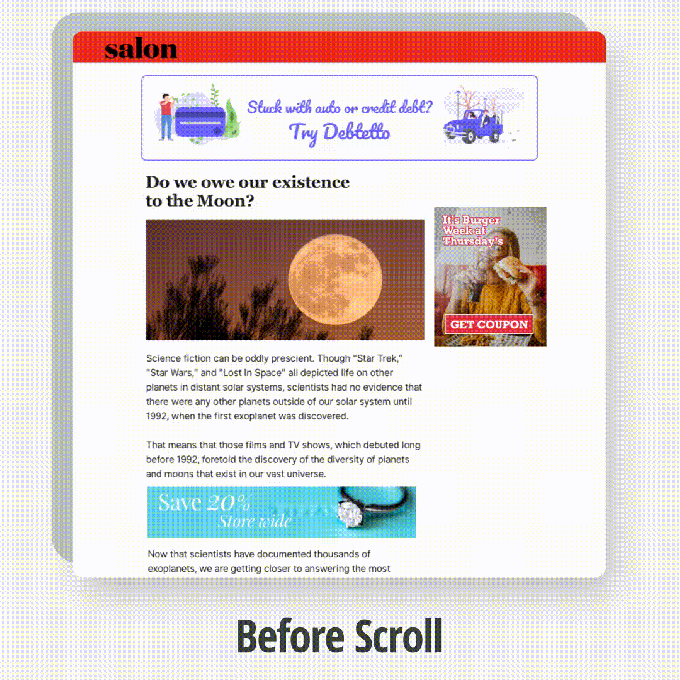After a long period of invite-only beta testing, Scroll is officially launching today, offering ad-free access to sites like BuzzFeed News, Business Insider, Salon, Slate and Vox for an introductory price of $2.49 per month.
CEO Tony Haile previously led analytics company Chartbeat, and he said he founded Scroll because of his frustration with the way news sites were becoming dragged down by ads and trackers — and despite those performance-slowing/privacy-defying practices, publications were still struggling to make money.
“Basically, we were trying to think through: How would the internet have evolved if it didn’t have to rely on ads [from the start]?” Haile said. “What would the economics look like?”
The solution that he and his team came up with is a subscription where consumers pay (the price is starting at $2.49 for the first six months after launch, then goes up $4.99 per month) for “a that’s web that’s twice as fast, with no shadowy trackers, no ads, no pre-rolls.” Publishers, meanwhile, make more money than they would have by showing ads to those same visitors.
The consumer experience may resemble what you can already get with an ad blocker, but Haile said it offers a few key advantages. For one thing, you won’t run into the issues you currently might with partner sites that detect ad blockers. For another, it works smoothly on mobile — once you’ve logged into your account on the Scroll site, you should be able to visit any of the partner sites and view them without ads, and you can also read via the Scroll mobile app.

Plus, there’s what Haile described as the “good karma” of knowing that you’re supporting the publishers behind the news and stories that you actually read.
He noted that every reader’s payment is dispersed separately, based on their own “engagement and loyalty,” rather than putting all of the subscription revenue into a single pool. So your money will never go to a site that you’ve never visited — and you’ll even get a monthly report showing which publishers your money is supporting.
Haile said Scroll has already signed up around 300 partners. (TechCrunch isn’t one of them, but I hope that changes.) The startup estimates that a normal page view brings in only $0.011 through advertising, versus $0.016 with Scroll. And the startup also offers a revenue calculator to help publishers confirm that they won’t be losing money.
Speaking of publishers, Haile said he’s trying to bring a “broader range of sites” into Scroll, representing a similarly broad range of viewpoints — again, because the money isn’t going into a single pool, you don’t have to worry about supporting a site that you don’t like (unless you’re doing a lot of hate clicking and reading).
Still, he will be exercising some editorial judgment: “I’m too fucking old to deal with Nazis. I don’t want to give them money.”
Of course, many (non-Nazi) publishers are also experimenting with their own paywalls and subscriptions. Haile argued that Scroll is complementary to those efforts, because it allows publishers to offer a better experience to readers and make more money from them, even if they’re not yet “superfans” who are ready to sign up for that specific subscription.
“We don’t get in the way of that,” Haile said. “We’re trying to solve that other problem, to make the internet not suck.”
from TechCrunch https://ift.tt/38L0QbB
via IFTTT
Comments
Post a Comment